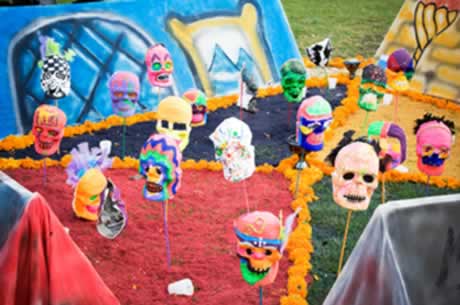Daniel: Hi Olga, how are you?
丹尼尔:嗨,奥尔加,你好吗?
Olga: Fine, Daniel, how are you?
奥尔加:我很好,丹尼尔,你怎么样?
Daniel: Good, thanks. I wanted to ask you something. I'm really interested about Mexican holidays.
丹尼尔:我也很好,谢谢。我想问你件事。我对墨西哥节日非常感兴趣。
Olga: What?
奥尔加:什么?
Daniel: Can you tell me something about it?
丹尼尔:你能给我介绍一下墨西哥的节日吗?
Olga: Sure but what do you want to know? I mean why are you interested in Mexican holidays?
奥尔加:好啊,你想了解什么?我是问,你为什么对墨西哥节日感兴趣?
Daniel: What kind of holidays you have, what do you do in those holidays?
丹尼尔:墨西哥有什么节日,你们在节日期间会做什么?
Olga: Well my favorite holiday is the Dìa de los Muertos, the Day of the Dead.
奥尔加:嗯,我最喜欢的节日是墨西哥亡灵节。
Daniel: What is it?
丹尼尔:那是什么?
Olga: What do you think about when you hear Day of the Dead?
奥尔加:你听到亡灵节的时候,想到了什么?
Daniel: I don't know. It's a bit scary, isn't it?
丹尼尔:我不知道。有点可怕,是吧?
Olga: Yeah, kind of but actually for us Mexicans it's not really scary. We're so used to it. Actually that day we celebrate the, not celebrate but remember the people who are already dead especially in our close family.
奥尔加:是有点儿可怕,实际上对我们墨西哥人来说,这并不可怕。我们已经习惯了。这个节日是我们庆祝,不是庆祝,是纪念已故家庭成员的日子。
Daniel: OK.
丹尼尔:好。
Olga: We put an altar for them which is like a big table decorated with flowers, bread, coffee or whatever the person that is dead used to like and we think that on that day that person is going to come back from the dead.
奥尔加:我们会为死者准备祭桌,在一张大桌子上放上鲜花、面包、咖啡等逝去的人以前喜欢的食物和物品,因为我们认为逝去的人会在这一天回来。
Daniel: Really?
丹尼尔:真的吗?
Olga: Yeah and visit us and maybe eat the food.
奥尔加:对,他们会回来看我们,可能还会吃我们准备的那些食物。
Daniel: OK.
丹尼尔:好。
Olga: It's on November first, the second too. The second, the altar is still there and after that we just take everything off and go on with our lives.
奥尔加:11月1日到2日是亡灵节。11月2日那天,祭桌还要摆在那里,之后我们就可以把上面的东西拿走,继续过我们自己的生活了。
Daniel: You keep the altar only on the first and the second?
丹尼尔:只在11月1日和2日这两天摆祭桌?
Olga: Yeah.
奥尔加:对。
Daniel: OK and do you do it just for your family or do you go and visit friends or other relatives?
丹尼尔:好,你们是只纪念家人吗?还是会去拜访其他亲戚朋友?
Olga: No, we only keep it within the family actually.
奥尔加:不会,我们只纪念家人。
Daniel: OK.
丹尼尔:好。
Olga: Well sometimes we do it at school but still it's just like you know to keep the tradition but usually in the family.
奥尔加:有时我们也会在学校里进行纪念活动,不过这只是为了保持传统,通常我们只纪念家人。
Daniel: OK.
丹尼尔:好。
Olga: Well another holiday I can think about is Easter. You have Easter too in Chile?
奥尔加:另一个我想介绍的节日是复活节。智利也有复活节吧?
Daniel: Yes, we do have Easter.
丹尼尔:对,我们也有复活节。
Olga: Easter we actually don't keep it traditional any more.
奥尔加:实际上,我们不再像以前那样传统地过复活节。
Daniel: What do you mean?
丹尼尔:你是什么意思?
Olga: You know traditionally we make plays where we represent Jesus and the moment when he died and everything right? But you know we don't reflect about it any more. We just go on vacations to the beach and celebrate and you know go to concerts and stuff.
奥尔加:传统上来说,我们会扮演耶稣,重现耶稣死亡的情景。不过现在,我们已经不再这样做了。我们会去海滩享受假期,去听音乐会,享受这个节日。
Daniel: Just as Chilean people do.
丹尼尔:和智利人一样。
Olga: I guess it's kind of a trend now right?
奥尔加:我想这是现在的一种趋势,对吧?
Daniel: Yeah. We don't really think a lot about Easter.
丹尼尔:对。我们不太关心复活节了。
Olga: Yeah.
奥尔加:对。

译文属可可原创,仅供学习交流使用,未经许可请勿转载












